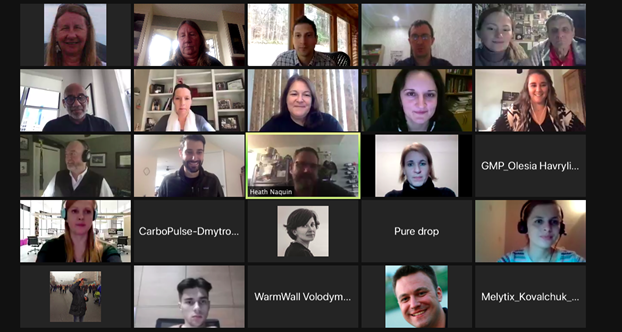The new pandemic brought new challenges to human civilization. COVID-19 switched priorities from entertainment and traveling to health and safety. It damaged economies and business, but medicine and science stepped to the forefront of the battle. It is hard to imagine how people survived diseases and lockdowns a century ago but today digitalization helps to connect services and products with communities even in spite of a pandemic.
The life in science as in many other professions looks completely different than it was before. The most difficult part of distance working (particularly when city transportation is restricted) is laboratory experiments which cannot be digitalized, only postponed and substituted with other activities. On the other hand, scientists can be more focused on publication of results.
Significant changes were brought to meetings, conferences, education and trainings, the majority of which changed to a virtual format. I will describe here participation in two projects illustrating the possibilities which can be realized in the online form.
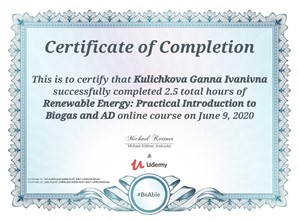
In 2019/2020 I had a useful and valuable experience of co-editing a series of articles for The Open Agriculture Journal via the online platform. The idea of the creation of the thematic issue “Sustainable biofuel production: Agricultural feedstock potential and biomass transformation technologies” came to Prof. Yaroslav B. Blume some time ago. Prof. Blume is the Director of the Institute of Food Biotechnology and Genomics (IFBG) of the National Academy of Sciences (NAS) of Ukraine. He is also the head of the Scientific and Technical Council of the target complex programs of scientific research of the NAS of Ukraine, "Biomass as a fuel feedstock" (2007-2012) and “Biological resources and the newest technologies of bioenergy conversion.”
The story of the implementation of this project started from my question “Where can we publish a biogas reviewing article?” The first variant of this article was written mostly by Ganna Kulichkova, a Ph.D. student and a 1st Category lab assistant of the laboratory of Biofuel Biotechnology and Innovations in Green Energy of IFBG. I was inspired by the proposed idea of participating in the thematic issue for The Open Agriculture Journal. The reasons were as follows: this journal is indexed in Scopus, articles in such journals (or indexed in the Web of Science Core Collection) are internationally visible, the most highly rated among scientific publications, and required for scientific degrees and titles. At the same time, the international peer-reviewing process of such journals involves professionals from the world in the particular theme which can force an increase in the level of manuscript as well as the scientific level of contributing authors.
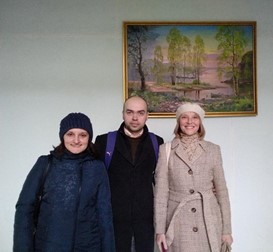
In 2019, while participating in Germany with “proBIOGAS International – Biogas engineering and operating training with plant visits” (sponsored by the U.S.-Ukraine Foundation Biotechnology Initiative), I obtained useful theoretical and practical knowledge about biogas technology, which considerably enhanced the resulting article “Plant Feedstocks and their Biogas Production Potentials”. During and after the training the main organizer and international biogas expert, Michael Kottner contributed to the article and became our co-author. Kottner is also the founding member and CEO (1992 – 2000) of the German Biogas Association, Managing Director of the International Biogas and Bioenergy Center of Competence, and Vice-President of the German Biogas and Bioenergy Society. Ganna Kulichkova completed online course of Michael Kottner “Renewable Energy: Practical Introduction to Biogas and Anaerobic Digestion.” The aforementioned course graduated organic constituents of substrates according to their anaerobic digestibility, and a whole section in the article reviewed this aspect from different literature sources.
Two articles from the series were about biodiesel production from Brassicaceae family plants and from Selenastraceae family microalgae. The article “Evaluation of Potential Biodiesel Feedstocks: Camelina, Turnip Rape, Oil Radish and Tyfon” is a result of 5 years of comprehensive investigations, and it seems enough qualified for defending a Ph.D. thesis based on it. Rostislav Blume, the corresponding author of the article, is a student of Taras Shevchenko National Kyiv University, and is an engineer in the laboratory of Biofuel Biotechnology and Innovations in Green Energy of IFBG. Also an Ukrainian emerging leader in Biotechnology, Rostislav Blume significantly contributed to three other articles in the series: “Finger Millet as a Sustainable Feedstock for Bioethanol Production”, “Ethanol Production Potential of Sweet Sorghum in North and Central Ukraine”, and “Efficiency of Switchgrass (Panicum virgatum L.) Cultivation in the Ukrainian Forest-Steppe Zone and Development of Its New Lines”.
Mastering remote working methods, on the 3rd of June, 2020 Rostislav Blume gave an online lecture in Zoom format. The lecture was on the trending topic, “Genome editing with CRISPR/Cas9” in the framework of the series of seminars “Advanced Frontiers of Biology” at the Palladin Institute of Biochemistry of the National Academy of Sciences of Ukraine. Later in 2020, The Royal Swedish Academy of Sciences decided to award the Nobel Prize in Chemistry 2020 to Emmanuelle Charpentier and Jennifer A. Doudna for the development of this method for genome editing as “Genetic scissors: A tool for rewriting the code of life”.
Another Ukrainian emerging leader in Biotechnology is Olena Tigunova. She is a research fellow in the laboratory of Industrial and Food Biotechnology of IFBG. With a Ph.D. in Biotechnology, Olena Tigunova is the first author of the article “Biobutanol Production from Plant Biomass”. The main outcomes of the authors’ original research focused on obtaining new butanol-producing strains of Clostridium genus and testing different sources of non-food raw material as a substrate for fermentation.
Oleksandr Melnychuk is a research fellow in the Cell Biology and Biotechnology Department of IFBG. Oleksii Volodko is the leading engineer in the laboratory of Biofuel Biotechnology and Innovations in Green Energy of IFBG. Both were required to publish their articles in the international journal indexed in Scopus or Web of Science in order to defend their Ph.D. theses. This task was completed, and corresponding articles “The Technology Used for Synthetic Polyploid Production of Miscanthus as Cellulosic Biofuel Feedstock” and “Fermentation of Sweet Sorghum Syrup Under Reduced Pressure for Bioethanol Production” were published in the autumn 2020 and fitted into the framework of the changing rules for Ph.D. thesis defense.

All ten articles from the series were published in The Open Agriculture Journal from October to December 2020. The articles included 33 contributing authors affiliated to 9 organizations. While compiling this series of articles I had the pleasure to meet the head of the Department of Extremophilic Microorganism Biology of Zabolotny Institute of Microbiology and Virology of the NAS of Ukraine Dr. Oleksandr B. Tashyrev. Tashyrev with co-authors also published the work “High Efficiency of Food Waste Fermentation and Biohydrogen Production in Experimental-industrial Anaerobic Batch Reactor” in The Open Agriculture Journal. Dr. Oleksandr Tashyrev and his team are experienced in anaerobic degradation of food wastes for the obtaining of biohydrogen and biogas. They formulated granular microbial preparation to perform efficient fermentation. His team is also very synergic, fast and active. I had an opportunity to reconfirm such conclusions during our joint participation in the U.S. State Department Program “Global Innovation through Science and Technology (GIST)," which empowers science and technology innovators in over 130 emerging economies. The program was implemented by the NGO VentureWell, in partnership with the University of Georgia and U.S.-Ukraine Foundation.
In 2019 I attended three offline programs which aimed to introduce scientific developments into the market. I participated in a national training program on intellectual property, technology transfer and innovation management (IP Marathon), the Sikorsky Challenge Summer Startup School, and the first wave of acceleration in the Business Academy Program of the UNIDO/GEF Project "Global CleanTech Innovation Program for Small and Medium Enterprises (SMEs) in Ukraine". Having the aforementioned background, the aim of enhancing my co-working environment forced me to create a team “Vinasse to Biofuel” in the framework of the GIST Innovates Ukraine 2020 program. GIST Innovates Ukraine is a perfect opportunity to find out more about project implementation and to increase the level of speaking English. This program can help to evaluate opportunities and to make informed decisions on how to move ideas forward through the process and ecosystem visualization, planning, and intensive customer discovery.
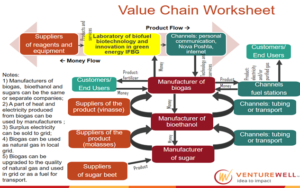 The GIST Innovates Ukraine Program started in May 2020, and it was the first Zoom meeting practice for Vinasse to Biofuel team members and it was further successfully introduced in our working activities. We performed some of the customer discovery interviews via an online platform. In the course of the Program, our team joined online seminars provided by the Bioenergy Association of Ukraine with partners: “Ways of using the digestate of biogas plants as a fertilizers”, “Prospects for production and consumption of renewable gases in Ukraine”, “Energy crops for bioenergy projects: prospects for Ukraine”, “Review of climate action and transition to sustainable energy in Ukraine” and others. During the seminars we had an opportunity to overview Ukrainian legislations concerning renewable energy sources and the current situation in the industry. We also were able to obtain the information about the results of relevant international projects, to ask questions and to participate in discussions.
The GIST Innovates Ukraine Program started in May 2020, and it was the first Zoom meeting practice for Vinasse to Biofuel team members and it was further successfully introduced in our working activities. We performed some of the customer discovery interviews via an online platform. In the course of the Program, our team joined online seminars provided by the Bioenergy Association of Ukraine with partners: “Ways of using the digestate of biogas plants as a fertilizers”, “Prospects for production and consumption of renewable gases in Ukraine”, “Energy crops for bioenergy projects: prospects for Ukraine”, “Review of climate action and transition to sustainable energy in Ukraine” and others. During the seminars we had an opportunity to overview Ukrainian legislations concerning renewable energy sources and the current situation in the industry. We also were able to obtain the information about the results of relevant international projects, to ask questions and to participate in discussions.
Among other mentors and lecturers of the GIST Innovates Ukraine Program, the mentor of our team was Rhonda Shrader. She is an Executive Director of the Berkeley-Haas Entrepreneurship Program as well as the U.S. National Science Foundation’s I-Corps program for the Bay Area Node. Rhonda Shrader graduated in Berkeley-Haas with an MBA in strategy and operations and earned a degree in neuropsychology and pre-medical studies from Harvard. Interesting, that a whole startup movement with direct implementation of just created innovations came from the Silicon Valley, and the University of California (Berkeley) is one of the universities that is situated near the Valley contributing to it with students and developments.
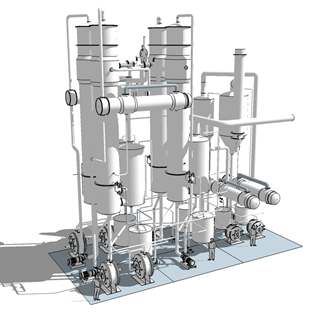
The project of Vinasse to Biofuel team which was accelerated in the course of the GIST Innovates Ukraine 2020 is concerning beet vinasse utilization in Ukraine. Sugar beet vinasse is a brown liquid with unpleasant odor which is generated in large quantities as a waste of the ethanol production from beet molasses. In 2019, about 500,000 tons of beet vinasse were poured onto the fields of filtration by distilleries of Ukraine. The use of this wastewater as a field irrigator is limited because of the high potassium content, and the use as a fertilizer is limited due to the high water content which makes transportation commercially inefficient. Concentration of vinasse saves place and money for transportation and fermentation equipment and makes the vinasse chemically stable. Concentrated vinasse can be realized as a fertilizer, as a substrate for biogas production or can be directly incinerated for heating purposes on the plant. The idea and leading of the project belongs to Dr. Sergii P. Tsygankov, the Deputy Director of IFBG and the Head of the laboratory of Biofuel Biotechnology and Innovations in Green Energy of IFBG. The project for vinasse concentration equipment created in the project is now being built at the State enterprise Haysinsky Distillery (Haysin, Ukraine).
Communication with smart and inspiring people is a very enhancing and enriching experience. For the distance working and development in science and technology I would recommend participation in thematic online seminars, publication and editing articles, Clarivate (Web of Science) webinars (in Eng, Ukr or Ru), World Intellectual Property Organization (WIPO) Academy online courses and GIST Innovates Ukraine 2021. In spite of the challenges, we should move forward, improve ourselves, make discoveries and implement innovations because this is why we are here, scientists in Science!
-Tetiana Ivanova, Research Fellow, Laboratory of Biofuel Biotechnolgy and Innovations in Green Energy, Institute of Food Biotechnology and Genomics, NAS of Ukraine

